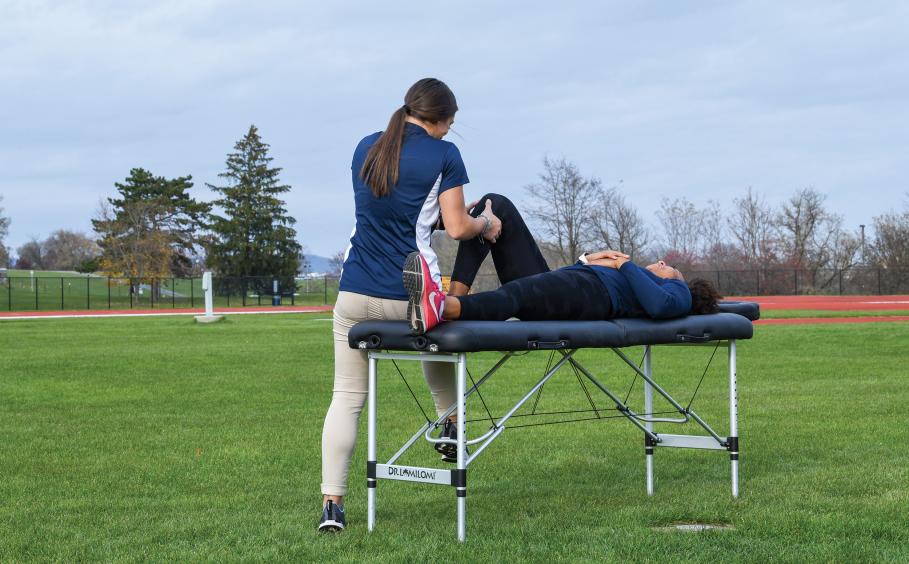Admissions Requirements

Applying to the Master of Athletic Training (MAT) Program
The curriculum employs a holistic approach to admissions. This entails a balanced consideration given to experiences, attributes, academic metrics, and how the applicant might contribute value as an athletic training student and potential future athletic trainer. Selection is highly competitive and based on those students who demonstrate the greatest potential for success in graduate study.
Applications are reviewed and admission is offered on a rolling basis until the program reaches capacity. Because transcripts and test scores may take several weeks to arrive, we highly recommend that prospective students submit their applications as early as possible. Early applications also ensure full consideration for financial aid and other potential funding opportunities.
We strongly recommend that applicants submit materials through ATCAS before February 1. Applications received after February 1 will likely be ineligible for potential graduate award programs. Late applications will be considered through June 10. Incomplete and new applications submitted after June 10 will not be accepted.
Application Information
- General criteria for admission to the Athletic Training program
-
- Applicants must hold a bachelor’s degree (or equivalent) from a U.S. regionally accredited institution or international equivalent.
- An undergraduate major in the health sciences is preferred, but this is not a mandatory requirement.
- There is no minimum grade point average (GPA) requirement for admission. Applicants ordinarily have a cumulative and combined science GPA of at least 3.0. However, prospective students with lower GPAs are encouraged to apply. In exceptional cases, the program may approve admission by reason of special backgrounds, abilities, and interests.
- Prerequisites
-
- Foundational knowledge is required for admission consideration. Listed below are the subjects and corresponding number of credits applicants must complete before enrollment. For applicants on a trimester schedule, 5-to-6 quarter hours at minimum satisfy a prerequisite.
- Anatomy and Physiology (lab optional): 3-4 credits
- May be completed in various departments such as anatomy, biology, health science, integrative physiology, kinesiology, or neuroscience.
- Biological Science (lab optional): 3-4 credits
- May be completed in a department of anatomy, biology, or neuroscience.
- Chemistry (lab optional): 3-4 credits
- Physics (lab optional): 3-4 credits
- Psychology: 3 credits
- Statistics: 3-4 credits
- Anatomy and Physiology (lab optional): 3-4 credits
- A minimum letter grade of C is required in each course linked to this list. Furthermore, coursework in these subjects has a five-year currency. This currency requirement may potentially be waived for an applicant who has been working full-time and continuously in the healthcare field since completing the coursework. Although completion of coursework is not required until the time of enrollment, no more than two courses specifically linked to this prerequisite list can be outstanding at the time of application.
- Advanced placement credit accepted at an undergraduate institution can satisfy a number of prerequisites, including biological science, chemistry, psychology, and statistics courses. College-Level Examination Program credit may also satisfy course prerequisites.
- Foundational knowledge is required for admission consideration. Listed below are the subjects and corresponding number of credits applicants must complete before enrollment. For applicants on a trimester schedule, 5-to-6 quarter hours at minimum satisfy a prerequisite.
- Optional preparation
-
The following coursework is not required, but strongly recommended.
- Basic Emergency Care: 1-4 credits
- Biomechanics: 3 credits
- English Composition or Intensive Writing: 3 credits
- Exercise Physiology: 3 credits
- Medical Terminology: 1-4 credits
- Nutrition: 3 credits
- Standardized exam scores
-
The Graduate Record Examination (GRE) is not required for admission. If applicants have taken the GRE, we advise that they share their score(s). If applicants have not taken the GRE but have SAT and/or ACT scores, we advise that they be shared. However, the SAT and ACT are not required for admission.
- Documenting foreign coursework
-
Applicants who attended a foreign school or earned their degree outside of the United States are required to submit their foreign coursework to a US-based evaluation service for a course-by-course US equivalency report. This report should then be sent directly to ATCAS from the evaluation service. Do not send foreign transcripts to ATCAS, including those printed in English or translated into English; they will be discarded.
As services can take several weeks to process transcript(s), applicants are recommended to contact a foreign transcript evaluation service as early as possible. For more information about this process, including vendors and accepted formats, please review the information provided here.
- English proficiency for international applicants
-
Test scores (TOEFL/IELTS) may be required for international applicants. See GCAC-305 Admission Requirements for International Students for more information.
- Shadowing/observation hours
-
Shadowing/observational experiences are not required for admission but are recommended. In applicable cases, applicants have the option to provide evidence of having completed shadowing/observational hours. Ideally, these experiences would be under the supervision of a professional in good standing with the Board of Certification for the Athletic Trainer (verification can be done through the organization's directory).
- Personal statement
-
A personal statement must accompany application materials and include why an applicant is pursing the degree program, with focus on how their background and interests match well with the curriculum. Applicants should also preset a brief summary of short- and long-term goals relevant to career planning.
- Letters of recommendation
-
A letter of recommendation from two different references is required. Letters should focus on the applicant's academic, professional, and personal attributes as well as potential for successful graduate study. Potential references may include, but are not limited to, the following:
- An athletic trainer you interacted with during a shadowing/observational experience
- A faculty member from your college/university studies
- A supervisor/employer from and internship, job, specialized support group, or other activity
- Interview
-
- Selected candidates will be required to meet with the admissions panel for a personal interview. The panel looks for attributes such as maturity, empathy and compassion, motivation, ability to communicate, cultural sensitivity, critical thinking skills, and potential to achieve career fulfillment as an athletic trainer.
- Interviews may be conducted in-person or remotely, and provide an opportunity for candidates and the panel to interact.
- Discussion will center on how the program’s mission and applicant’s goals align. Additional dialogue will include rationale for entering the profession and pursing a degree at Penn State.
- Attestation of essential technical standards
-
Applicants offered admission to the Master of Athletic Training program must review the technical standards deemed essential for successful completion of the curriculum. Prior to and every semester after enrollment, students are required to attest that they meet the technical standards either with or without reasonable accommodations. Upon completion of the attestation, Penn State reserves the right not to admit any applicant who cannot meet the technical standards. This right to not admit or the right to rescind admission applies in cases where reasonable accommodation cannot be provided, would result in a fundamental alteration to the technical standards, or would compromise patient/client care or the safety of the prospective and/or currently enrolled students.
- Background checks and medical clearances
-
In addition to these admission requirements, participating clinical education sites (on- and off-campus) may require specific background checks and/or medical clearances in order to host a student for experiential learning purposes. Examples include screening of state or federal criminal records and vaccination records. Sites may choose to deny a student’s placement in their facilities based on the information in these records. Such instances may create a barrier for students to satisfy compulsory clinical education activities and therefore not complete degree requirements necessary for graduation.
- Two-step application process
-
- All candidates must first submit their materials through the Athletic Training Centralized Application Service.
- Candidates selected for admission must then complete a secondary application through The Penn State Graduate School.

